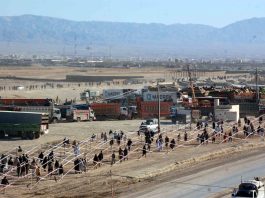
Peshawar: Saeeda, 20, is a nurse at the Lady Reading hospital Peshawar. She does not want to work in this hospital but is continuing because she has no other option. Since that fateful night when one of the night shift doctors tried to rape her when she had gone to call him to attend an emergency patient, life has not been same for her.
“I had gone to the doctors’ office that night to inform him about a patient’s condition. He locked the door and started harassing me. He could not rape me because I managed to run away.” Saeeda said her voice still laced with fear.
“I informed the Head Nurse about the incident, but she advised me to keep quiet. Everybody in the nursing department asked me to patch-up with the doctor otherwise, they said, I would not only lose my job but also my reputation.
“Despite all the warnings and threats, I went ahead and filed an application against the doctor with the hospital administration. My application was turned down on the ground that I had no proof to establish my claim against the doctor and was told to patch-up with the doctor after accepting his verbal apology. At the end of the day I had no choice but to withdraw my application and to reconcile with the situation,” said Saeeda
Saeeda (her real name not revealed for security reasons) is not the only victim of women harassment at workplace in Khyber Pakhtunkhwa (KP) or in Pakistan for that matter. Millions like her are suffering at the hands of beasts, taking advantage of a woman’s vulnerabilities at the workplace. Despite the enactment of the Protection against Harassment of Woman at Workplace Act 2010 at the federal level, there is no let up to harassment cases.
Bakht Bibi who is also working at the Lady Reading Hospital Peshawar as a head nurse told the News Lens Pakistan that rather than registering a complaint against sexual harassment, the nurses tolerate it fearing a backlash to the complaint that could smear their own reputation.
She said that different NGO’s like Da Hawa Lur and Blue Veins have trained nurses on as to how to avoid getting caught up in a harassing situation. There is a decline in the number of harassment cases in the hospital since.
Khurshid Bano, Chief Executive Da Hawa Lur plans to persuade the government in (KP) to make creating awareness about sexual and other forms of harassment mandatory in schools and colleges through legislation.
“About 77 percent women are employed in different jobs in Pakistan, while the informal sector employees 65 percent women. Sixty percent women in KP are working in different industries associated with formal and informal sectors. These are staggering numbers and to leave such a large population in the hands of their employers is not a wise step. At least we can train women, and educate them how to deal with harassment until the informal sector is regulated,” said Khursheed.
A human right activist, Qamar Naseem, associated with an NGO Blue Veins criticised the government for its failure to implement the Act.
He said that Section 3 (1) of the law required every organization to constitute an inquiry committee within thirty days of the enactment of the Act. Neither the government nor the private sector fulfilled this requirement in letter and spirit throughout the country.
The legislation required all organizations, including the federal and the provincial government ministries, departments, corporations, educational institutions, private commercial organizations and registered civil society associations, to form inquiry committees consisting of at least three members each – one of them a woman – to probe complaints and give their findings within 30 days to the competent authority concerned that will award recommended penalties.
According to Bano in 2010, when this Act was passed, KP reported 200 cases of sexual harassment at workplace the same year. “I am sure this figure would have multiplied manifold. Our women are still shy because of cultural constraints to report to police or even to the inquiry committees in their offices.”
She further added that interaction with the police revealed that a large number junior officers at police stations had no idea about the law. “We had to counsel these junior police officials about the amendment made in the Pakistan Penal Code (PPC) 509 making sexual harassment illegal not only in the workplace but also in public spaces and within the home.
Talking to the News Lens Pakistan, the Secretary Social Welfare and Woman Development, Hidayat Jan, said that his department are doing their best to provide protection to the working women. “We run technical training programs to educate women about their rights and handling the hostile environment.”
Three model police stations were established in Peshawar with women staff members but according to a police officer from Faqir Abad Police Station Peshawar, Zeenat Bibi, women were hesitant to report cases of sexual or other harassments in these police stations as well.
“Most of the women are reluctant to file a complaint because of their families who refuse to stand by them,” said Zeenat.
Khyber Pakhtunkhwa Minister for Information, Mushtaq Ahmad Ghani, defended his government’s stance in this regard while talking to the News Lens Pakistan saying: “We have zero tolerance policy on women harassment at workplace.”
However, he laments that cultural constraints and lack of courage in women tie our hands to lash out against the accused following full administrative and legal process. In most of the cases, we lack proof because either the victims refuse to help legal teams collect forensic evidence or they hide the evidence to protect their honour.
As per rules, the Protection against Harassment of Women at the Workplace Act 2010 has to be acted upon with the help of ombudsmen offices in provinces. KP has failed to establish the office of the ombudsperson even after five years.
Provincial Commission on the Status of Women Chairperson, Neelam Toro, told the News Lens Pakistan that the commission had sent three names for the ombudsmen to the Chief Secretary and the Chief Minister KP. So far, no action has been taken. The procrastination, she said was unusual.
Talking to the News Lens Pakistan, Mehrgarh (NGO) Director Maliha Hussain, said that governments in Pakistan are still not clear about the priority they should give to laws pertaining to women, their rights and security. For the government, it is still a non-issue and therefore we find lapses in the implementation processes. The NGO’s have to work double on women rights issues especially in the context of harassment to persuade the government to pull their act together and do something.
“The KP government might be lagging behind in creating the office of the ombudsperson, but I would say that this government has been far more effective than others in removing obstacles in the way of implementing this Act. The Women Welfare Department KP has formed various committees at different levels to train and monitor both government and private organizations in this regard.”
On a question about victims’ reluctance to come forward and report harassment to the police, she said that it was for this very reason that a provision to establish committees in every organization was made mandatory in the Act so that the element of confidentiality in such cases was maintained and the victim did not have to go to the police.
“Unless we understand the spirit of the law, we will keep bringing up negativities. I do not fully agree that this law has been a failure in KP or elsewhere in Pakistan. Government organizations like, NADRA and State Bank of Pakistan have not only implemented this law but have tried several cases to purge harassment from their institutions,” said Hussain.
She even disagreed to the notion that women are not aware of this law and they want to remain silent sufferer.
“Since the enforcement of this law, Mehrgarh has received 3,600 complaints about harassment at workplace. The women who had come to us did not know how to go about registering complaints, or were shy at the onset. When we trained them or assisted them, they were persuaded to put forward their complaints at the right forum. The number of cases registered in court tells a similar story. When the law was passed in 2010, only three cases had been reported in courts since 1947 under the PPC 509. After the amendment in PPC 509, that made sexual harassment illegal at workplace, 50 cases have been reported from 2010 to 2015”, said Hussain.
She said it might look a small figure but when assessed in comparison it comes out as a big achievement.
“I am fully on board to the fact that a lot is needed to create awareness among the masses,” said Hussain.



